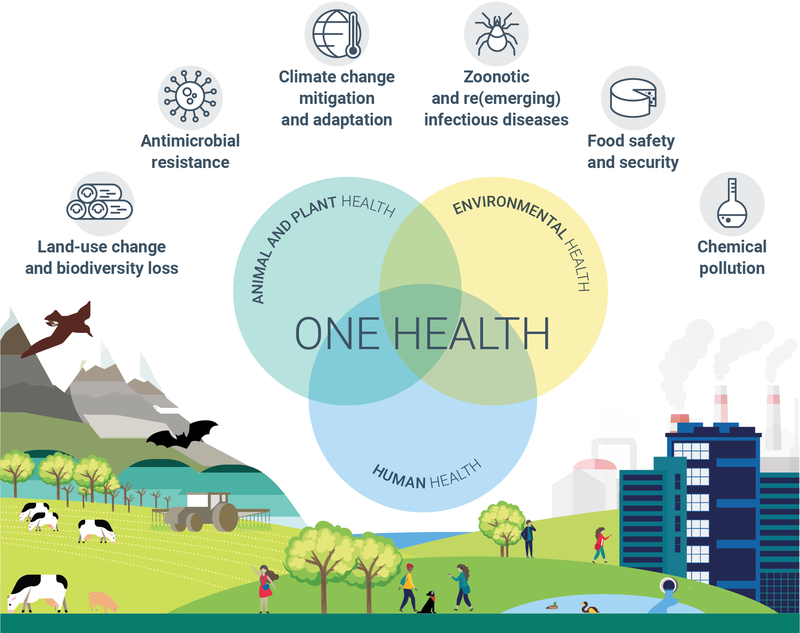One Health
Canada faces increasingly complex and frequent threats to health and well-being, driven by unsustainable patterns of production and consumption. These challenges highlight the profound interconnection between human health, animal health, plant health, and ecosystem health. Allongside the correct monitoring solution this is another place that Artificial Intelligence will impact human health.
There are many areas of OneHealth and we focus on Zoonotic diseases and antimicrobial resistance.
- Zoonotic Diseases: Many known and emerging infectious diseases originate from zoonotic pathogens. The risks posed by these pathogens are exacerbated by global biodiversity loss and changes in land use and climate change. Changes in eco-system connectedness can impact how diseases spread from wildlife ecosystems, through agroecosystems, through farms and eventually to us. These risks are expected to increase, impacting communities globally.
- Antimicrobial Resistance (AMR): Excessive and inappropriate use of antimicrobials in humans and animals has led to high rates of AMR. This results in numerous infections and deaths annually, posing a significant public health challenge.
Addressing these issues requires a transdisciplinary and multi-sectoral approach, known as the One Health approach. No single discipline or sector can tackle these challenges in isolation. The One Health approach emphasizes collaboration across human, animal, plant, and ecosystem health to prevent, predict, detect, and respond to health threats.
The Role of AI in One Health
Artificial Intelligence (AI) is playing an increasingly important role in the One Health approach. AI technologies are being used to:
- Predict and Monitor Disease Outbreaks: AI models analyze vast amounts of data to predict disease outbreaks, helping to implement timely interventions.
- Enhance Environmental Monitoring: AI systems monitor environmental changes, detect pollution levels, and assess ecosystem health, providing crucial data for decision-making.
- Improve Diagnostic Accuracy: AI algorithms enhance diagnostic accuracy for both human and animal health, leading to better treatment outcomes.
Practical Application of the One Health Approach
At the Canadian association for artificial intelligence in medicine, we have an interest in predicting and understanding how pathogens spread through ecosystems, and in modelling the effects and risks posed by changes in ecosystem connectedness.
Our approach involves integrating and sharing knowledge across different disciplines, such as veterinary, environmental, and human health sciences. Researchers and risk assessors must work together to assess health risks posed by disease vectors or contaminants. Additionally, risk managers and policymakers must act to reduce human pressures on the environment to mitigate health risks at their source.
Incorporating AI into the One Health framework enhances our ability to address these challenges more effectively. AI-driven insights and innovations support a more comprehensive and unified response to health threats, ensuring the well-being of humans, animals, plants, and ecosystems.
The collaborative efforts of Canadian institutions, supported by advanced AI technologies, ensure that the One Health approach remains dynamic and responsive to the evolving health landscape.

“We believe we can contribute by better understanding how immune-systems adapt to prevent the spread of disease through ecosystems.”
Javier Alfaro
President CARAM
